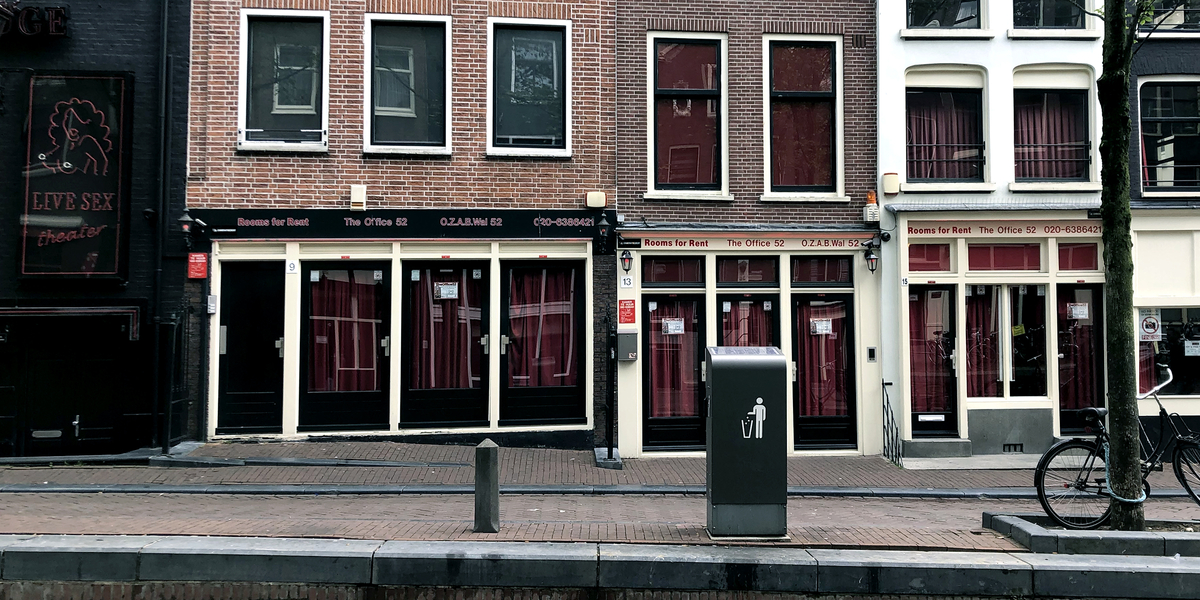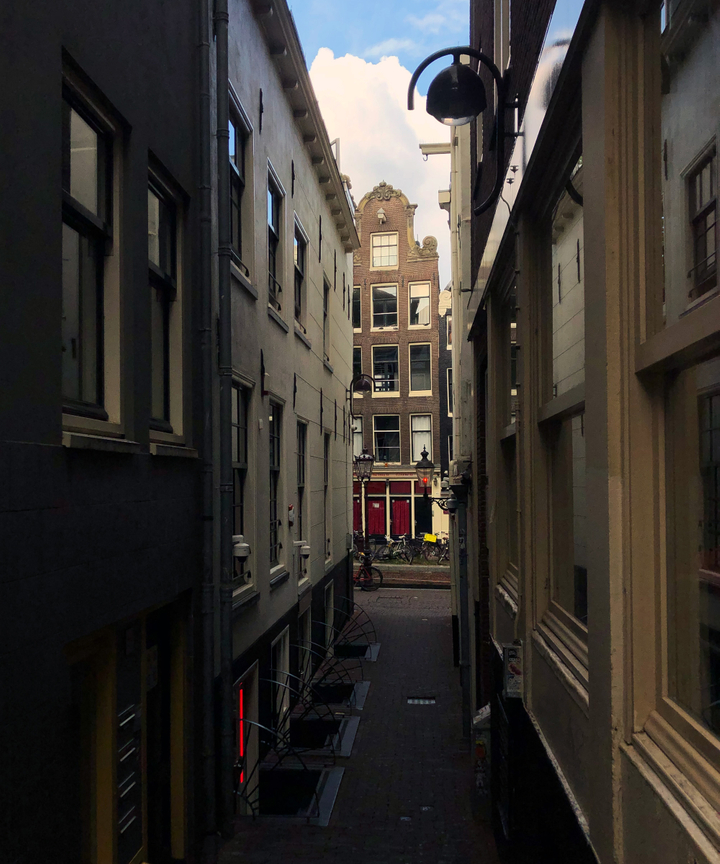
Published 16 September 2022
Lees dit artikel in the Nederlands
I’m a non-Dutch, part-time full-service window worker. I have been working for five years in De Wallen, Amsterdam’s world famous red light district. I have also worked in a private house and for an escort agency, but I prefer to work behind the window. My colleagues and I feel safe here, but the city municipality threatens our ways of working. The city continues to restrict and remove window brothels, and our needs and perspectives continue to be ignored.
In 2007, Amsterdam municipality closed around a third of its window brothels. The city used supposed crime in the area to transform prime real estate into cheap tourist shops. Now only 252 out of 396 windows remain in De Wallen, yet visible sex workers are considered a tourist attraction, creating overcrowding and nuisance. I spoke with two of my colleagues about our workspaces, and the threat of the mayor’s plans to close them.
The mayor, Femke Halsema, describes the windows as a "showcase of vulnerable women" who are "being humiliated". Elvira, a Dutch woman who has worked here for over ten years, says she likes her work: “It’s my body… And if I want to work here, that's my choice.” Elvira feels safe behind the window, one of the only licensed spaces available to her as a trans woman. She fears being forced out of her workplace and community, and her colleagues agree: “Everyone I know wants to stay”.
Camille comes from Bulgaria and has been an independent window worker for at least a decade: “We can refuse customers. And when there are tourists, we have a lot more choice.” Elvira, Camille and I agree that there is no suitable workspace alternative, since tourists are crucial to our incomes. Research shows that 93% of us want to stay put, and we mostly prefer working with tourists.
Unfolding Project 1012 2.0
In 2019, the mayor announced a strategy [Raadsbrief – juli 2019] to shut down all De Wallen window brothels. During a two day public discussion over four apparent options, we demanded more windows and at minimum, no reduction. The mayor and the media divisively reported on two sets of interests and two sides; the sex workers and the residents, ignoring those of us who live locally.
After the ‘debates’, the city interviewed over 100 sex workers about the proposals. Their report acknowledged we felt safe in the area, yet the municipality continued to pursue alternative workspaces. The city published another report, admitting that most visitors would not travel to a new sex-entertainment area outside the city centre.
A Covid lockdown was in full force, when Halsema ramped up threats [Raadsbrief – oktober 2020] to expel window workers to the outskirts. When we were just starting to work again, her threats were reinforced [Raadsbrief – oktober 2021].
In early 2021 the city organised a sex worker advisory group, with around 15 sex workers. We strongly objected to the new centre, and demanded to keep the window brothels open. We explained our need for more safe workspaces, adding that we should be allowed to work from home, free of a strict licensing system; ultimately pushing for full decriminalisation rather than the current restrictive legalised model. Our views were ignored and we felt so frustrated and demoralised by the municipality that by the third meeting, only two of us showed up. Since then, the group has taken a much needed hiatus.

Gemeente Amsterdam is no friend to sex workers
By February this year, the erotic centre felt inevitable when the mayor announced [Raadsbrief besluitvorming Erotisch centrum] the next stage: to choose a location. Last month, the municipality announced plans to reduce the weekend closing hours for local windows from 6AM to 3AM.
My colleague gathered 130 signatures from fellow window workers, opposing the erotic centre. These signatures were added to a letter co-written by Failed Architecture and the Prostitution Information Center (PIC), co-signed by other interest groups. Halsema responded that "vulnerable status" Eastern European and Latin American sex workers had been forced to sign, by brothel owners. This is not Halsema’s first jab at non-Dutch sex workers, whom she considers defenceless compared to the "sturdy Dutch women" of the past, who fitted a more nostalgic, historical view of the red light district.
Camille invites the mayor to visit her window for some insight, to really “see the relationships with clients, and with [brothel] owners.” According to Elvira, “[Halsema] just doesn't want to see our demands - she just wants to see her plans through.”
Although our future in De Wallen remains uncertain, one thing is clear: we are tired of being used as the city’s political pawns. If there’s anyone we feel victim to, it’s the municipality. It’s not too late for the mayor and municipality to open their eyes and see the solution; it’s already right here in De Wallen.
Until then, we will fight to remain in the neighbourhood as long as possible. “I’ll stay here,” says Elvira. “And if she wants to build [an erotic centre], she can build it. But it's gonna be empty!" Camille adds: “I will fight for it. Not only for me - we are community.”
To get involved, contact PIC, SAVE (Sex Workers Against Violence and Exploitation), and SWAD (Sex Work Alliance Destigmatization).
Photos by Red Insight.

El
El is a part-time sex worker, full-time extroverted introvert. They are allergic to lilies.
